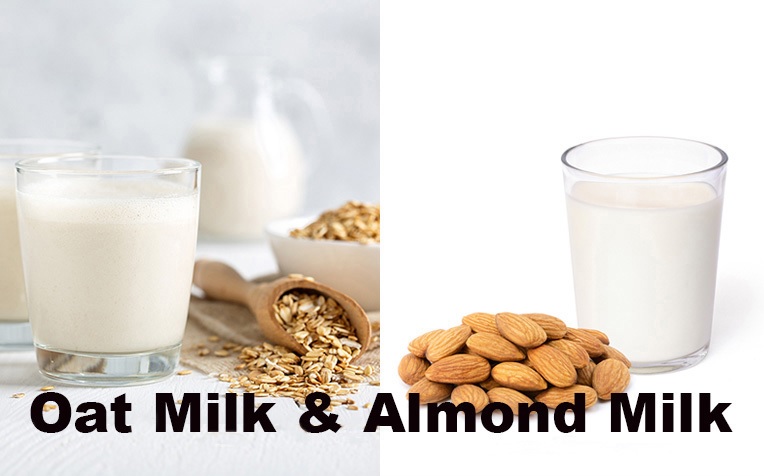Blog

Oat milk and almond milk are both popular plant-based milk alternatives. Here are their benefits in short:
Oat Milk:
Nutrient-rich: Oat milk is often fortified with vitamins and minerals like calcium and vitamin D, making it a nutritious option.
High fiber content: Oat milk contains beta-glucans, a type of soluble fiber that may help with heart health and digestion.
Creamy texture: Oat milk has a creamy consistency, making it a good substitute for dairy milk in coffee, cereal, and recipes.
Almond Milk:
Low in calories: Almond milk is typically lower in calories than cow's milk, making it a suitable option for those watching their calorie intake.
Good source of vitamin E: Almond milk contains vitamin E, which acts as an antioxidant and supports skin health.
Lactose-free and dairy-free: Almond milk is naturally free from lactose and dairy, making it suitable for people with lactose intolerance or dairy allergies.
Summary:
In summary, both oat milk and almond milk have their unique nutritional benefits. Oat milk may be a better choice if you're looking for a milk alternative with higher fiber content and added nutrients, while almond milk may be preferable if you are watching your calorie intake and prefer a nutty flavor. It's essential to consider your specific dietary needs, preferences, and health goals when choosing between the two. If possible, consult with a healthcare professional or a registered dietitian for personalized advice.
|
Milk type |
Cow's milk |
Oat milk |
Almond milk |
|
Calories (kcal) |
120 |
115 |
30 |
|
Carbohydrate (g) |
12.5 |
18 |
0.5 |
|
Protein (g) |
9.3 |
3 |
2 |
|
Total fat (g) (Saturated fat) (g) |
3.8 |
2.75 |
5 |
|
Fibre (g) |
0 |
2 |
1.25 |
|
Vitamin B12 (ug) |
0.5 |
0.75 |
0.95 |
|
Calcium (mg) |
500 |
280 |
230 |
|
Vitamin D (mcg) |
3 |
1.25 |
1.9 |
|
Vitamin E (mg) |
n/a |
n/a |
0.75 |

Comments (0)